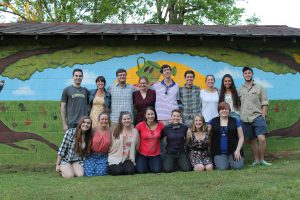The Learning in Action Quality Enhancement Program (QEP) at The University of Alabama uses experiential learning to help undergraduate students gain real-world problem solving skills before heading into their desired field of work. Through experiential learning opportunities (ELOs), faculty and staff are able to enhance students’ learning by immersing them in real situations in which they use their academic knowledge and gain invaluable understanding.

In EN 455: Advanced Studies in Writing, Dr. Lauren Cardon taught students the art of cooking and blogging. Cardon described her class as a graduate school approach to writing. Students responded to an assigned reading followed by a personal reflection. Then students created or experimented with a recipe related to the reading and prepared it for the class to enjoy while presenting their article for the class’s blog, Crimson Fried. A QEP grant assisted students with the cost of food supplies for cooking.
Jared Powell, a senior English and religious studies double major, contributed to the blog twice, featuring his aloo sabzi (a potato stir-fry) and succotash. Throughout the class, Powell combined cooking and writing in ways he never imagined before. The cooking aspect of the course presented valuable lessons in time management for students. Powell said the reflections allowed him to reminisce on the way he ate as a child and he enjoyed connecting food to the reading assignments.
Through the blog, Powell learned how to captivate his readers with pictures of food and engaging descriptions. After graduation, he plans to continue his writing career at graduate school.
Along with the other students in EN 455, Powell has benefited from Crimson Fried due to Cardon’s intentional instruction. Cardon incorporated numerous ways for her students to actively learn in and out of the classroom.
“Students are starting to understand what it’s like to have a career as a writer,” Cardon said. “If you’re going to be a writer in this day and age, you’re going to have to self promote. We have been really emphasizing the act of learning on campus and getting students to take charge of their own learning instead of being passive learners.”
Cardon specializes in American literature and teaches classes that tie cultural studies and writing together. Originally from New Orleans, Cardon is a self-proclaimed foodie, and she was inspired to share her love for cooking and writing with her students. Due to the increasingly competitive writing industry, Cardon wanted her students to learn how to write for specific audiences outside of the classroom and to gain knowledge on blogging.
Cardon collaborated with the Alabama Digital Humanities Center to create the class blog on WordPress. This partnership allowed students to learn the backend of a website, upload their own articles, insert pictures, add hyperlinks and gain experience with other essential website skills.
When students presented their food, they also read their article to the class. Instead of writing for an audience of one, students gained practice writing for a much broader audience on a specific topic.
Carson encouraged students to get creative with their recipes. One student, Nick Patton, prepared acorn cookies for the class, which were inspired by Jean Hegland’s book “Into the Forest.” After Patton posted the article, Hegland commented on the post, complimenting him on his article and promising to try the recipe. Crimson Fried has given students a voice where interactions like this are possible.
In March, Cardon set up a food tasting event through QEP for her students at Epiphany: Farm to Fork. Tres Jackson, Epiphany chef, prepared his dishes for a new, fast and casual restaurant, Animal Butter, for the students to sample. After the tasting, students wrote responses and reviews of each dish for the chef to take into consideration for his new menu. The QEP grants are one way UA provides resources to support faculty and staff who are offering ELOs.
Cardon believes ELOs help faculty and staff create engaging learning environments for students.
“It’s a good way of getting instructors to stay excited about what they teach and to keep it new, while experimenting and having fun,” Cardon said. “Also, it’s more rewarding when your students are excited.”
Learning in Action is now accepting applications for its 2016-2017 Fellows Program and the Learning in Action Assessment Team. For more information, visit experience.ua.edu.
